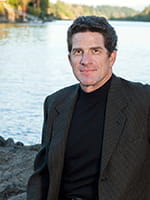Paul Satryb explains how his degrees from Walden resulted in an opportunity to improve people, profits, and the environment.

Paul Satryb.
Photo credit:
Kerri Ann Garfield.
In the business world, sustainability is often a buzzword. For Paul Satryb ’13, ’11, it drives his career. After completing his bachelor’s and master’s at Walden, he found himself in a completely new position tailor-made for his skills.
He innately knew he could effect sustainable environmental change at Hydra-Power Systems in Portland, Ore., where he has worked for nearly 20 years. The company specializes in distributing and manufacturing fluid power products for the construction, marine, mining, and agricultural industries worldwide—custom systems like power units that control a hydro-electric dam or the mooring units for an offshore oil rig.
As the first quality manager for the company, he created and implemented a system to improve company performance, consumer responsiveness, and environmental responsibility.
In this new position, Satryb documents all processes with employees (an essential task, he says, to obtain their buy-in), audits those processes, and develops supplier and customer management programs to capture performance information and metrics— and ensures each process is sustainable.
He’s also using industry guidelines to develop his quality management system. He’s currently working to become a certified manager of quality and organizational excellence with the American Society for Quality. This and other certifications, he explains, not only continue his goals to be a lifelong learner, they will also help him contribute to growth and sustainability in his 100-member company.
“Since implementing this new program alters so much of what we do, I’ve relied heavily on what I learned at Walden and my experience in change management,” Satryb says. Through his courses in the MS in Management and BS in Business Administration programs, he learned that “the most difficult barrier to change is leading the culture of an organization in a new direction.”
“Since my studies introduced me to sustainability in business, I’ve felt a moral and ethical imperative to help employees understand the triple bottom line, which includes people, the environment, and profits. By refining my skills, I gained the tools to create and maintain quality controls that limit the use of natural resources to only what’s required to run the business, while simultaneously raising profits.”
This new role for Satryb was years in the making. He decided to enroll at Walden to earn his bachelor’s after 30 years in the fluid-power industry, 17 of them as a manufacturing manager at Hydra-Power Systems. Essentially, he wanted the academic credentials to support his on-the-job experience.
He chose Walden for its social change philosophy. “I connected with the concept that an education should do more than afford a person a higher salary or promotion,” he says. “It appealed to me that a university would encourage students and alumni to use their knowledge to improve the societies in which they live or have influence.”
But one degree wasn’t enough to achieve his career goals. He decided to get his master’s next and says he was very transparent about his ongoing education with Hydra-Power’s director of manufacturing, who values a master’s degree. A month before graduation, the director offered Satryb a new position designed for him: quality manager.
“I want our employees to see that their impact is much broader than the four walls that they work within. It’s about thinking further and more broadly than just getting a product out the door,” he says. “My degrees gave me the tools, experience, opportunity, and authority to guide our organization toward positive change.”
Tell us why you’ve returned to Walden for another degree at [email protected].



